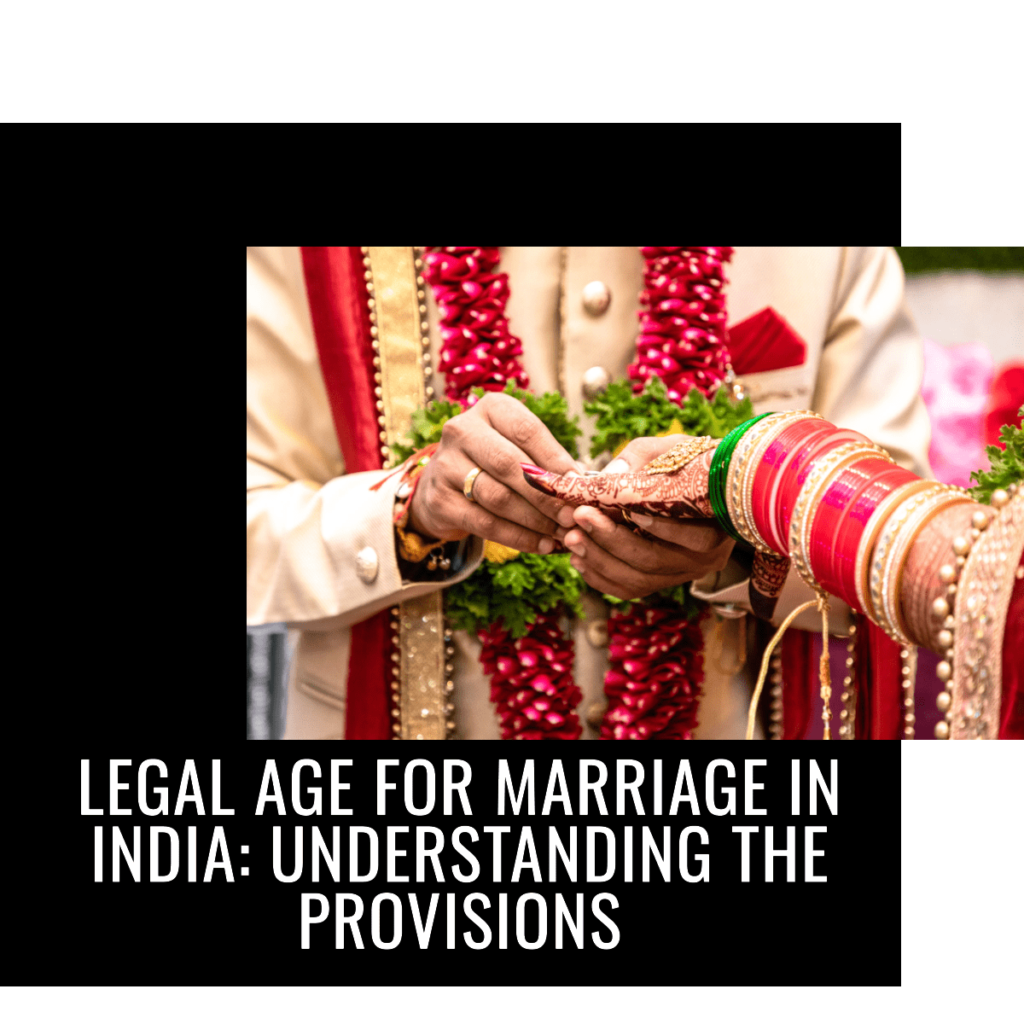
Marriage is a significant institution that carries both social and legal implications. In India, the legal age for marriage is a matter regulated by various acts and laws. These regulations are in place to protect the rights and well-being of individuals, particularly children and minors. In this post, we will delve into the legal age for marriage in India and the associated legal provisions, emphasizing the importance of adhering to these guidelines.
Understanding the Legal Age for Marriage
In India, the legal age for marriage is defined by two primary acts: The Special Marriage Act, 1954, and The Hindu Marriage Act, 1955. Let’s explore these acts and their key provisions.
Legal Age for Marriage As Per The Special Marriage Act, 1954
Section 4(c) of The Special Marriage Act, 1954, sets the legal age for marriage in India. It states that the male must have completed the age of twenty-one years, while the female must have reached the age of eighteen years. This provision ensures that both parties involved in a marriage are of a suitable age to make informed decisions.
Additionally, this act includes the concept of “custom” regarding specific tribes, communities, groups, or families. The State Government has the authority to specify customs applicable to these groups, provided that the customs meet certain criteria, such as continuity, reasonableness, and conformity with public policy.
Legal Age for Marriage As Per The Hindu Marriage Act, 1955
Section 5(iii) of The Hindu Marriage Act, 1955, mandates that the bridegroom must be at least twenty-one years of age. And the bride must have reached a minimum of eighteen years at the time of marriage. This act primarily applies to marriages among Hindus, defining the permissible age for marriage within this community.
The Prohibition of Child Marriage Act of 2006
In addition to the above acts, The Prohibition of Child Marriage Act of 2006 plays a crucial role in addressing child marriages in India. The act defines a “child” as a person who has not completed twenty-one years of age if male and not completed eighteen years of age if female. It specifically targets child marriages, where at least one of the contracting parties is a child.
Role of Child Marriage Prohibition Officer
The act also establishes the position of a Child Marriage Prohibition Officer, responsible for preventing and addressing child marriages. These officers actively fulfill a vital role in enforcing the legal ages for marriage. Ensuring the protection of minors from early and forced marriages.
Legal Jurisdictions
The act designates the relevant legal jurisdictions for addressing matters related to marriage. Notably, the term “district court” may vary depending on the area. In areas with a Family Court established under the Family Courts Act, 1984, that court has jurisdiction. On the other hand, in other areas, the principal civil court of original jurisdiction holds authority.
Protection of Minors
The term “minor” is defined under the Majority Act, 1875. It states that a minor is a person who, according to this act, has not attained the age of majority. The Majority Act, 1875, serves as a foundational reference in determining when an individual reaches adulthood.
Conclusion
In India, the legal age for marriages is an essential aspect of ensuring the rights and well-being of individuals, particularly children and minors. The provisions under The Special Marriage Act, 1954. The Hindu Marriage Act, 1955, and The Prohibition of Child Marriage Act of 2006 collectively set the framework for legal age requirements and protection against child marriages.
It is imperative that individuals, families, and society as a whole adhere to these legal provisions. Furthermore, respecting the legal age for marriage safeguards the rights and dignity of individuals. Thereby contributing to a more just and equitable society. Therefore, the enforcement of these laws and raising awareness of their importance are essential steps in eradicating child marriages and promoting responsible and informed unions.
At Patil Legal Solutions, we are committed to upholding the legal rights and well-being of individuals in matters of marriage and family law. For legal guidance and assistance regarding marriage and related issues. Please feel free to reach out to our experienced team of legal experts.
Remember, the legal age for marriage in India is not just a legal provision; it’s a safeguard for the rights and futures of our children and youth.
Note: The legal age of marriage has changed several times in India. Since 1978, the legal age for marriage has been 18 for women and 21 for men.
The Prohibition of Child Marriage (Amendment) Bill of 2021 would raise the legal age of marriage to 21 for both boys and girls. The bill has been referred to the Parliamentary Standing Committee



Leave a Reply